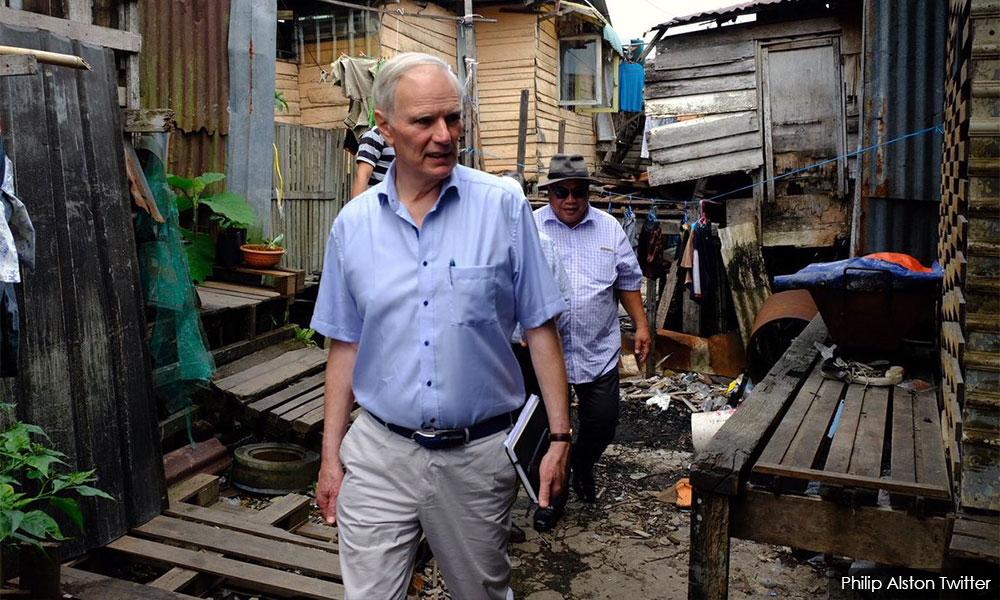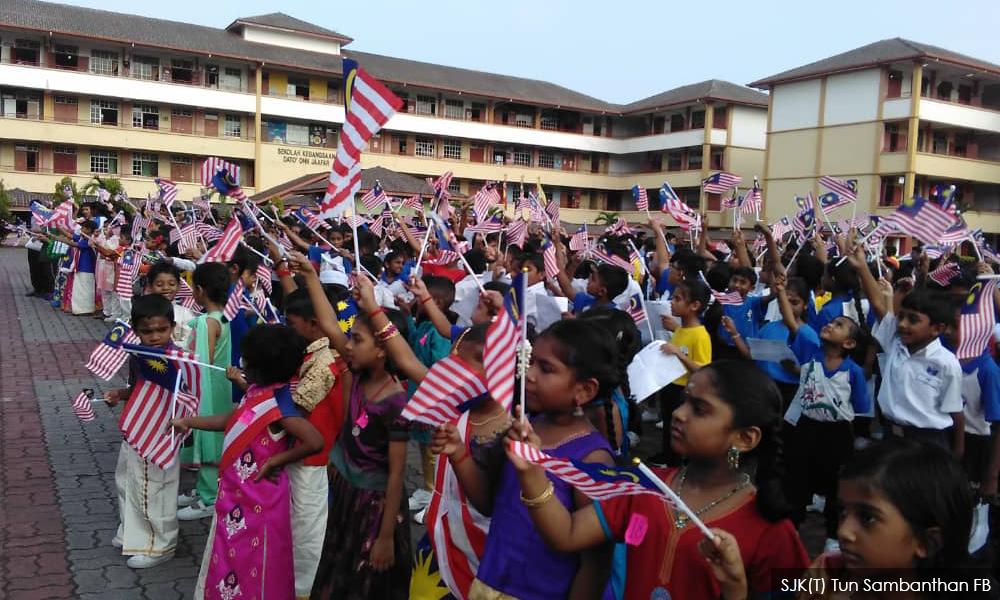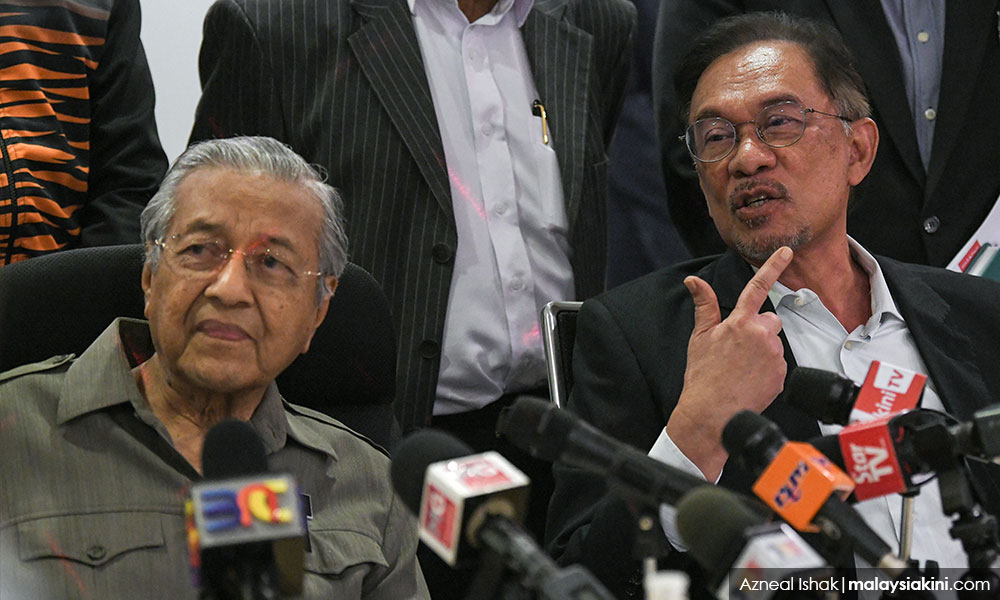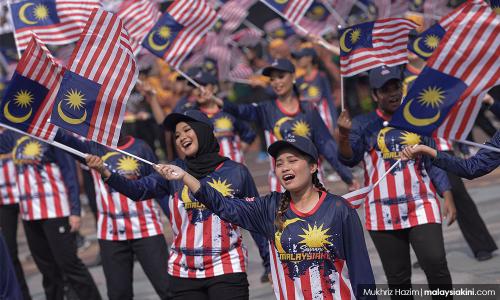Reflections on Merdeka Day
COMMENT | What do we have to celebrate about?
To speak about how we fought and obtained our freedom from the British in 1957 is getting quite silly and tiresome considering it is now more than 60 years since we became independent.
And for the Sabahans and Sarawakians, that date has no significance.
It is not my intention to pour cold water on what is an auspicious day. As I watched the march past, I could not help but be moved by what I saw.
Nevertheless, I think it would be more useful for us to reflect on what we have achieved since independence and how we are as a multiracial and a multi-religion society.
First, it is important for me to state that Malaysia has made substantial progress since independence. No one can dispute that.
But there have been setbacks, and there are trends and directions that are worrying.
Poverty
For a start, poverty in the country is a major issue. It has not been recognized and acknowledged as a major issue. Until now.
For years, we deluded ourselves that we had eradicated poverty from our midst - we brought it down to 0.4 percent of our population.
We ignored the poverty in our midst - the urban slums and the incidence of children who went to school without breakfast, who were malnourished and stunted. And we puffed our chests and said that we would soon become a developed nation.
Today, an independent UN special rapporteur from the UN has concluded after extensive studies and interviews that our poverty rate is close to 15 percent. That brings it in line with most other countries.
At 0.4 percent we were the lowest in the world. All of the establishment accepted that statistic without protest or murmur.
The question we should ask is why was there no protest? We deliberately made poverty disappear with a “statistical sleight of hand”.
The teachers did not see it and the health professionals did not see it. Was it a deliberate conspiracy of silence?
And Dr Mahathir, miffed at the idea of a UN official descending from somewhere and debunking this myth, summarily dismisses the conclusion by saying that these were the biased conclusions of a study made by a so-called foreign expert staying in a five-star hotel in Kuala Lumpur for one day.
All this after he and many other ministers had said that we should keep an open mind. Never mind the fact that many local experts, social activists, and NGOs working on the ground have been raising the alarm about poverty levels for many years.

That one man was UN Special Rapporteur on Extreme Poverty and Human Rights Philip Alston (photo). Alston is an Australian international law scholar and committed human rights practitioner. He is John Norton Pomeroy Professor of Law at New York University School of Law, and co-chair of the law school’s Centre for Human Rights and Global Justice.
In human rights law, Alston has held a range of senior UN appointments for over two decades, including UN Special Rapporteur on extrajudicial, summary or arbitrary executions, a position he held from Aug 2004 to July 2010.
In 2014, described as an independent expert, he was appointed to an unpaid role as UN special rapporteur on extreme poverty and human rights.
The preliminary findings were based on several months of research and calls for submissions by Alston’s team. The project culminated in an 11-day visit to all states, where he met with various government officials, communities, activists and academics.
Alston’s findings are shared by many Malaysian experts and academics.
I can understand the reluctance to accept these findings. It raises questions about the effectiveness of previous policies. And debunks the claims we made about some of our successes.
The federal and state governments will not acknowledge this level of poverty. To do so would raise questions about what they have been doing all these years.
We have pretended a false poverty rate for a long time. We have many poor Malaysians in our midst. It also raises questions about how and why we have millions of foreign workers in the country when we have so much poverty.
The government should accept these findings and develop a plan to eliminate poverty as a top priority. Together with affordable housing and access to good education, the plan can lift them out of poverty and transform this nation.
Equally concerning is the state of racial and religious harmony in the country.
There is racial polarisation in Malaysia.
There are few non-Malays in the civil service and the Armed Forces.
The civil service and the armed forces are dominated by a single race. This is not good for the country. Non-Malays must be seen to be participating more actively in the administration and the defence of the country.
A civil service that broadly reflects the demography of the country would be sensitive to the needs of all our people.
Education
The majority of Chinese children attend vernacular schools, and many Indian parents are also sending their kids to Tamil schools.
There are also 160 private schools in the country for those who can afford the fees. Then, there is much homeschooling.

Mission schools have lost their character, with some deciding to go private.
Thousands of Muslim children attend Islamic schools across the country.
There should be a long-term plan to attract (not compel) all Malaysians to attend a superior school system administered by the government. Our children from all communities should attend school together and learn to mingle and respect each other from an early age.
At the tertiary level, the Malays dominate public universities while the Chinese dominate private universities. UITM, as the largest university in the country, is almost exclusively opened to Bumiputera students.
Entry into public universities for a high number of Malay students is mainly through matriculation examinations perceived to be an easier route. For non-Malays, it is mostly by sitting for the STPM examinations.
Recently, a small concession was made to allow a higher number of Indian students into the matriculation programme.
Again, every effort should be made to foster integrated education.
Extreme policies
Institutions for Islam administration have grown in recent times. Jakim has a large budget and a large bureaucracy.
PAS wants to set up an Islamic state but in the interim, push for hudud laws and enhanced punishment for Islamic offences.
PAS and UMNO have now come together and are pursuing race and religion-themes issues aggressively.
Non-Muslims react sharply and sensitively to policies and programmes that they consider intrusive and attempts to promote Islam. Hence, the recent controversy over the introduction of Jawi khat learning in schools.
And the earlier reluctance to participate in the Vision Schools initiative.
Where is Harapan's vision?
The Pakatan Harapan government was meant to be a new hope. A government that was not wedded to the policies and prescriptions of the past.
It was supposed to implement the pledges made in its election manifesto. The administration started well and then stalled.
It stalled in the face of intense opposition formed by a coalition of PAS and Umno.
They targeted the DAP as a party that was anti- Malay and anti-Islam and exploited the schisms and fissures within Harapan.
And most of all, they exploited the simmering racial and religious tensions in the country to the hilt.
The reaction of our politicians towards the issue of the controversial preacher Zakir Naik was surprising.
The biggest shocker throughout the entire Zakir Naik saga was delivered by the Youth and Sports Minister Syed Saddiq Syed Abdul Rahman. His about-turn was astonishing in its rapidity - from wanting to send Zakir back to India and claiming “the non-Muslims are like my family” to inviting the preacher to his home for dinner.
It was clearly an attempt to cure any damage caused by his previous stance.
How did this foreign fugitive become so influential among the Muslims in this country? His expertise is running down other religions during his speeches.
How can that be good for a multi-religious society like ours?
It is reassuring that the police have taken steps to calm the situation.

A common vision
Harapan is in disarray. The question of whether PKR president Anwar Ibrahim will ever succeed Mahathir is out in the open.
Mahathir makes cryptic statements. And there are rumours of impending splits within PKR, and of Umno crossovers.
The non-Malays who voted overwhelmingly to bring Harapan into power watch with dismay as old-style politics reappear.
The DAP is placed on its back foot trying to explain its role in all of this to its
supporters. Lim Kit Siang explains quite depressingly the predicament of the DAP. And pleads for patience.
Of course, Harapan needs more Malay support to remain in power. We all know it.
No one is suggesting any departure from the constitutional arrangements. Malay rights will not be compromised. The question is will Harapan abandon its reform agenda in its desire to obtain Malay support?
Will those in Putrajaya abandon the idea of a more inclusive government and reject extremist and racist policies and actions?
Will they support a needs-based approach to eradicating poverty? Or will each Harapan component party continue to pull in separate directions?
Was it the intention to revert to Umno-style policies through Bersatu?
Over many years, the different races have become polarised - separate schools and separate lives. Each having a clear preference to be with their own kind.
Can this go on without serious implications to the nation?
An article by Mohd Tajuddin Mohd Rasdi of UCM University has gone viral.
In it, he expresses his pessimism about Malaysia’s future.
As a respected voice for moderation, his opinion has shocked many.
We take comfort wherever we find it. Our economy has slowed down. We have a huge household and government debts. We need stability. We need our people to be at peace with each other.
We need Malaysians to come together and to work hard to advance the nation and secure all our futures. Our middle-income trap holds us back.
We need a better education.
We need more investment, both domestic and foreign.
Our politics hold us back. There are too many issues that distract and divert us from the real issues.
Where are the visionary leaders who will bring us together!
Making reassuring speeches on Merdeka days is easy to do. Where is our plan?
Where are the reforms?
Do we have a future as a moderate inclusive multi-religion and multicultural society?
Are our current leaders up to the task?
These are critical questions we must ask even as we celebrate Merdeka Day.
DAVID DASS is a lawyer and Malaysiakini subscriber/commenter.
The views expressed here are those of the author/contributor and do not necessarily represent the views of Malaysiakini.
RM12.50 / month
- Unlimited access to award-winning journalism
- Comment and share your opinions on all our articles
- Gift interesting stories to your friends
- Tax deductable
